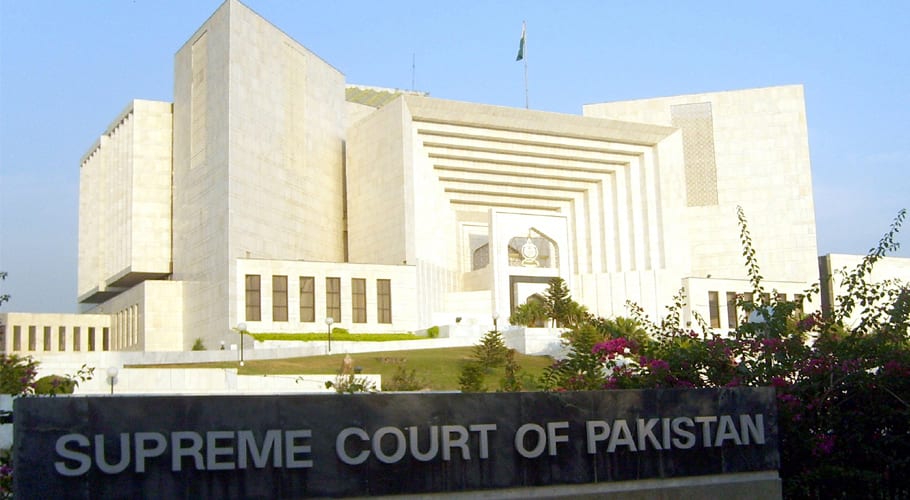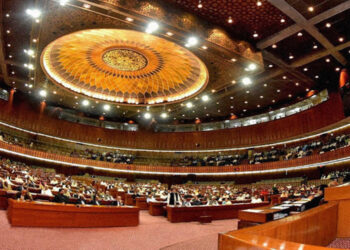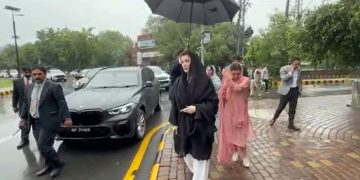ISLAMABAD: Chief Justice of Pakistan (CJP) Gulzar Ahmed has said that the parliament is the forum that must decide the method of voting for Senate elections including the degree of secrecy as the court could not limit jurisdiction.
The Chief Justice made these remarks while heading a five-member larger bench that had taken up a presidential reference seeking open ballot for the upcoming Senate elections.
The Chief Justice asked the Pakistan People’s Party (PPP) central leader Raza Rabbani to explain whether Senate elections were held under the Constitution or not. Raza Rabbani said that there were examples of voting in the lower house while the court was hearing the matter of the upper house of the parliament. The secret ballot was the voter’s own secret while a voter could share his secret with another voter and not with the state, he added.
He said that this was the intention of the Constitution so that there was no pressure on the voters. If the vote was made identifiable, it would not be just a voter’s secret, he added. He said that the Constitution protected the freedom of the voter and the identification of vote was tantamount to depriving a voter from his freedom.
He said that the question was whether the ballot was secret or not. The ballot was not secret but its secrecy commenced with the ballot paper coming in the hands of the voter. He said that the voter was also bound not to show vote and the secret ballot was protected in the Constitution. He said that voting also did bind state institutions and officials that they could not see the vote cast by a voter.
Justice Ijaz-ul-Ahsan, a member of the bench, asked the counsel that his argument was regarding the National Assembly elections. He said the voting for the National Assembly was free and free vote meant freedom of the voter. He said that there was no mention of free vote for Senate so it did not have to be secret. There was no reason to keep the vote secret with the idea of ‘proportional representation’, he added.
Raza Rabbani said that political parties had proportional representation in the National Assembly while the provinces had proportional representation in the Senate. If the court allowed an open ballot, the current election would be held under a temporary law and this provisional law already existed in the form of an ordinance, he added.
The Chief Justice responded that the court was not hearing the matter of ordinance. Rabbani said that he was not arguing about an ordinance but a constitutional point. According to the Constitution, elections of the Senate could not be held under a temporary law, he added.
Raza Rabbani said that the court only had to give an opinion in the presidential reference. Rabbani said the court only had to decide whether the Senate elections were held under the Constitution or not and next task was for the parliament.
He said that the parliament had to decide whether the vote in the Senate election would be open, identifiable or secret. The Parliament had to decide whether a constitutional amendment was required for Senate elections or a change in the law, he added.
He further said if the Supreme Court stated the Senate elections were not held under the Constitution then the presidential ordinance would come into force. He said if Parliament did not amend the Constitution or the law, then it would be deemed that the Senate elections were held under a temporary law.
Advocate Kamran Murtaza, the counsel for the Jamiat Ulema-e-Islam (JUI-F), said that the secrecy of the entire election process could not be finished for four or five votes. He said that a political question had been asked in the reference. The court should refer the matter to Parliament to answer the political question, he added.
Barrister Zaffarullah said that the Supreme Court should interpret the matter for the Senate elections, keeping in view the historical evolution. There were international resolutions to protect the secrecy of the vote, he added. The Chief Justice said that the court was not considering the question he was discussing.
The counsel for the Islamabad Bar Association said that the Supreme Court should decide whether the question raised in the presidential reference was worth answering or not. The counsel pleaded with the court to annul the reference as the question raised in the presidential reference was purely political.
Advocate Salahuddin, counsel for Sindh High Court Bar Association, said that his constitutional responsibility was to assist the judiciary. This was a serious political crisis and the court had to decide wisely, he added.
He said the current government had not apparently fulfilled its political responsibilities. He said that the reference on the Senate election was illegal. All parties except the ruling party were against it, he added.
The Chief Justice said that there were three options before the court. 1) Whether Article 226 applied to Senate elections or not? 2) Could there be proportional representation through a single transferable vote; and 3) Whether elections held under the Constitution were secret?.
He said that matters related to the secret ballot had been left for the Parliament. Salahuddin said that an amendment to this issue was already pending in Parliament. He said that the government also sent a reference and issued an ordinance.
The Chief Justice said that the court was not a parliament, nor it could limit its jurisdiction. Salahuddin said that the advice of the court had been sought through reference. The hearing of the case was adjourned till Thursday.



































